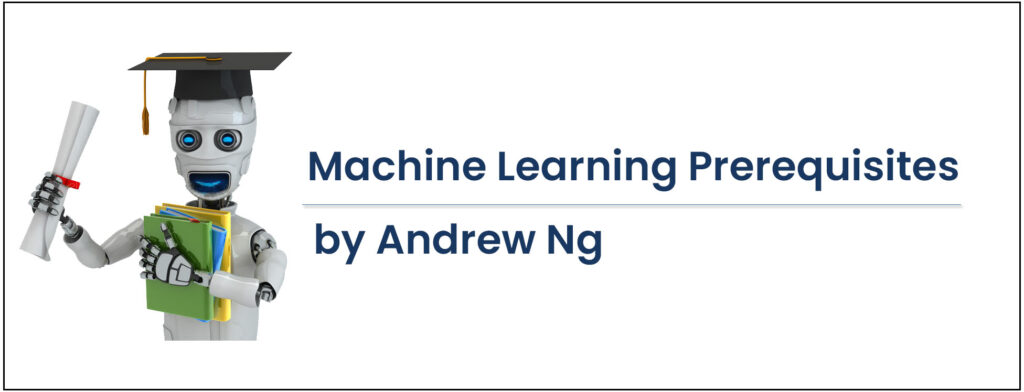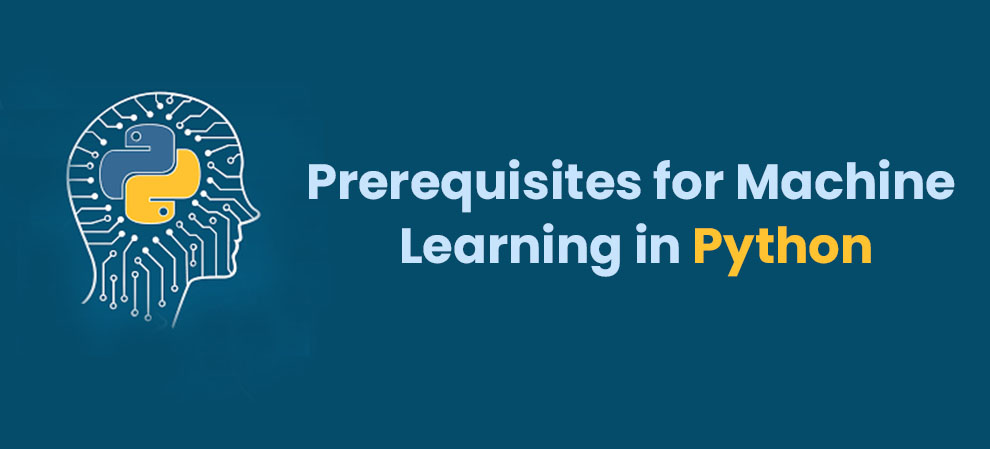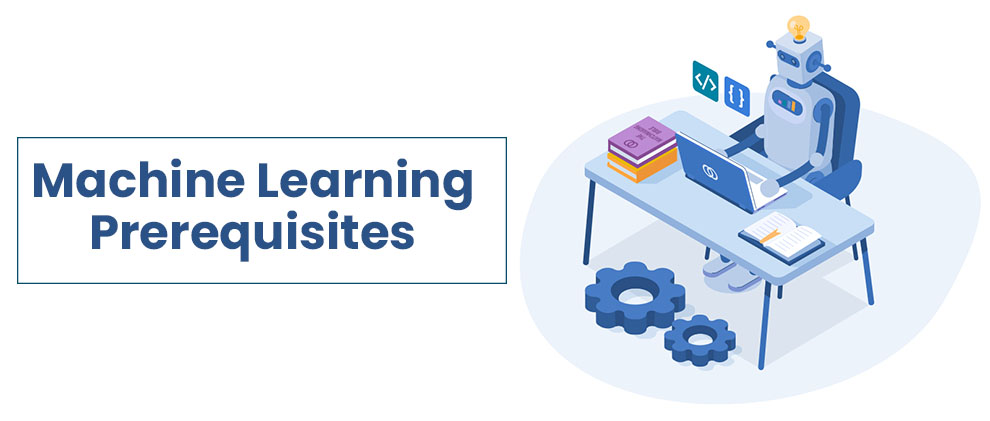All that you need for this Stanford’s machine learning course
Today, let’ talk about the much hyped Machine Learning Specialization – by Stanford Online and Deep Learning AI. It is one of the top-selling classes by Andrew NG. If you are interested in ML and still do not know about this offering, you perhaps live in a bubble.
It is an elementary specialization suited for beginners that equips you with machine learning fundamentals and trains you on how to employ the techniques for building real-world AI applications.
Andrew NG is the Founder of DeepLearning.AI, a General Partner at AI Fund, Chairman and Co-Founder of Coursera, and an Adjunct Professor at Stanford University. He has been an instrumental name behind the novel work at Landing.AI and Google Brain, Baidu, that brought about a revolution in the AI field.
He is also a leader of the critical research team at Stanford University. So, learning from him is both a privilege and an honor. But, it is a comprehensive specialization, and to make the most of it, you must fulfill the Stanford machine learning prerequisites.
What Are These Essential Requirements For This Specialization – We Tell You Straightaway!
Machine Learning requires certain prerequisites, for this specialization you need the following.
1. Intermediate Coding Knowledge – The instructor indirectly hints at acquiring intermediate Python programming knowledge for this class. In addition, you need familiarity with topics such as Python Data Structures, Writing a Function, and Loops.
But, if you are not well-versed with Python, we recommend taking a Python class online as it is one of the key prerequisites. On the internet, you can find several classes to help you acquire fundamental Python understanding, but our top recommendation is the
How to fulfil this prerequisite?
a. TOTAL Python: Become an Advanced Python Developer in 16 days – [Udemy]– It is a popular class with 26 hours of on-demand video that helps you master professional Python programming. By the end of the course, you can make robust, advanced, and beneficial programs and learn to apply Python in applications like Games, Artificial Intelligence, Machine Learning, Data Science, Administrative Management, and much more.
b. Python for Everybody Specialization – Offered by the University of Michigan – [Coursera]– It is another excellent pick to help you meet Andrew NG’s machine learning prerequisites. In this detailed specialization, there are five courses. The specialization takes approximately eight months, and you can complete it at a suggested pace of 3 hours per week.
2. High-school level Mathematics – Machine learning enthusiasts are often confused about the need and importance of mathematics in machine learning. Let us tell you that Mathematics knowledge is one of the prerequisites that you can’t ignore.
Computers can solve any mathematical calculation faster than humans. But, in machine learning course, knowledge of mathematics is not for solving math problems. Instead, this familiarity with help you understand the math application in the machine learning algorithms and their working.
In addition, fulfilling this prerequiste can equip you with the knowledge to pick the correct algorithm by accounting for its training time, accuracy, number of features, and complexity.
Moreover, both humans and computers perceive things differently. While we process an image in a two-dimensional or three-dimensional form, mathematics is needed for the computer to process images. Mathematics also aids in assessing the uncertainty and interval and choosing suitable validation methods and parameter values.
Lastly, another reason Mathematics is one of the top crucial machine learning Stanford Coursera prerequisites is that your math knowledge will bestow you with the bias-variance trade-off understanding. It helps you find the underfitting and overfitting issues, the primary concerns in any ML model.
How to fulfil this prerequisite?
Here’s a complete course to help you out
Mathematics for Machine Learning Specialization – by Imperial College London
Some Mathematics concepts you must know for a more streamlined experience with this course are:
a. Linear Algebra –Linear Algebra comprises linear transformations, matrices, and vectors. It is a pivotal subject and one of the essential Stanford machine learning prerequisites. You can use it to perform and transform dataset operations.
Some linear algebra concepts you should know for machine learning are:
- Linear transforms
- Algorithms in code
- Notations
- Tensor and Tensor Rank
- Matrix Multiplication
b. Calculus– Calculus is a vital Machine Learning aspect and another of the Andrew NG’s machine learning prerequisites. However, you do not have to be a pro at it. Having elementary clarity on it should suffice. Knowledge of multivariate calculus can help solve optimization problems.
Several machine learning algorithms employ an objective function concerning a set of desired model parameters, which control how well a model elucidates data. Some essential multivariate calculus concepts you must know are:
- Hessian
- Partial Derivatives
- Jacobian
- Vector-Values functions
- Laplacian and Lagrangian Distribution
- Directional Gradient
c. Statistics– It helps in drawing logical conclusions from the listed data. Statistics is an essential concept, which every data scientist or engineer should learn to comprehend the working of classification algorithms, such as discrimination analysis, distribution, logistic regression, and hypothesis testing in ML.
Stats is one of the necessary prerequisites for Andrew NG machine learning class, and its knowledge helps identify the goal from the available information and data. It also helps to transform and understand the sample observations into practical information.
Some concepts you must know for ML excellence are:
- Axioms
- Combinatorics
- Random Variables
- Bayes’ Theorem
- Expectation and Variance
- Conditional and Joint Distributions
- Random Variables
Related: Prerequisites for Machine Learning and AI | Machine Learning in Python Prerequisites | What Do You Need for AWS Machine Learning Certification?
About the Specialization
So, there are three courses in this specialization.
1. Course 1 – Supervised Machine Learning: Regression and Classification-It is a thirty-three class wherein you learn to build ML models in Python with machine learning libraries Scikit-learn and NumPy. Further, in the session, you will learn to construct trained supervised machine learning models to predict and classify binary tasks like logistic and linear regression.
2. Course 2 – Advanced Learning Algorithms– It is Part 2 of the three-part specialization and will take thirty hours to complete. In this class, you will learn to train and build a neural network with TensorFlow for performing multi-class classification. Further, you will also know how to apply the best practices for ML development and finally create and employ decision trees and tree ensemble methods, such as boosted trees and random forests.
3. Course 3 – Unsupervised Learning, Recommenders, Reinforcement Learning– It is the last course in the specialization. In this 27-hour class, you will learn to construct a deep reinforcement learning model and recommender systems with a content-based deep learning method and collaborative filtering approach. Further, you will also know how to employ unsupervised techniques for unsupervised learning.
Get through with the machine learning Andrew Ng prerequisites first to make the most of these courses.
How Is This New Machine Learning Specialization on Coursera Different From The Original Course at Stanford?
You need to know that this course was earlier available only on Stanford Online. Later a revamped version of it in collaboration with DeepLearning.AI was launched on Coursera. So, what’s the difference between the two?
In the new ML specialization on Coursera, you will study all the topics that focus on the vital concepts associated with machine learning and tools like TensorFlow. It varies from the original class because you will start with the foundational ML concepts and need no intensive background beforehand. There is a fine mix of mathematical theory, code practice, and intuition to help beginners in the class.
Since it is a decade-old class, many lectures and assignments in the new specialization are rebuilt to use Python, unlike Octave in the older session. Lastly, the practical advice section has also been updated to include all the emerging best practices from the past decade.
Prerequisites For The Old Machine Learning Course @ Stanford Directly
So, if you wish to ditch Coursera and take this course directly on Stanford|Online, here is a laydown of the vital Stanford machine learning prerequisites:
- Basic Statistics and Probability knowledge comprising concepts like mean, median, mode, gaussian distribution, standard deviation, and the probability rules
- Linear algebra and college-level algebra comprising knowledge of vector or matrix notation, operations, and derivatives
- Python Knowledge – Basic understanding of Python and Linux command line workflows
Final Word
So, these are all the machine learning Stanford Coursera prerequisites. Once you get well-versed with these prerequisites, your excellence in the course is guaranteed.





